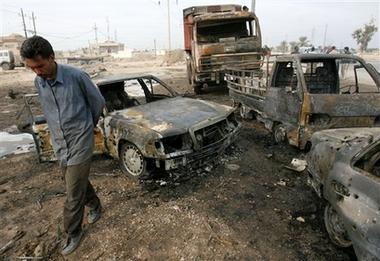This morning the AP has a story on Syria arming up.
Syria has embarked on an "unprecedented" effort to bolster its armed forces with Iranian and Russian help, the Israeli daily Haaretz reported Thursday.
Damascus has large numbers of surface-based missiles and long-range rockets, including the Scud-D, capable of reaching nearly any target in Israel, the report said, and the Syrian navy has received new Iranian anti-ship missiles.
Haaretz also said Russia was about to sell Syria thousands of advanced anti-tank missiles, despite Israeli charges that in the past Syria has transferred those missiles to Hezbollah guerrillas in Lebanon.
But what caught my eye is that once again, there are the Russians. Adding this to previous reporting, it really makes me wonder about Russian policy.
(Russia sending TOR-1 anti-aircraft missiles to Iran, rumors of a deal on longer range S-300 AA missiles (as well as other small weaponry,) Russia's continued support for the Iranian nuclear program, Russia's effort to sell weaponry to the Sunni gulf states, and even its efforts to begin discussion on a Saudi nuclear program.)
I see several overlapping possibilities in all this. The simplest would be the profit motive, but I also think it's interesting that Russia, one of the largest oil suppliers in the world, is making these diplomatically friendly overtures to the other major oil suppliers of the world.
Probably the worst possible analysis is that the Russians are attempting to make the middle east "ungovernable" to remove US influence from the region. (This would be a much larger and subtler version of what the US did to the Soviets in Afghanistan.)
Following on
Putin's major anti-US speech two weeks ago, I just find myself wondering at the Russian efforts and motive.
This is a purely speculative post but the prospects of a significant return of Russian influence in the middle east could be a serious challenge to the US. What happens if the Russians begin influencing middle east oil policy?
The Iraq war was a huge mistake of empire. The Baker-Hamilton proposition for regional talks was about far more than simply resolving Iraq. It was about reengaging and reinvolving the regional oil powers. It was about renegotiating the US's involvement in the region before those relationships are redefined for us.
(Here's our current representative in the region:
Condi Rice on the Israel-Palestine situation: ""It takes hard work, it takes patience, it takes perseverance, it takes getting up, you know, after a bad day and trying to make a better day. And that's what I'm going to do. So as long as I'm Secretary of State, that's what I'm going to do.")
(Sorry for the long rambling post, but something is going on here on a far larger level than Iraq with massive implications. I don't have the firmest of grasp on it, so I thought I'd just throw out what was on my mind.)























